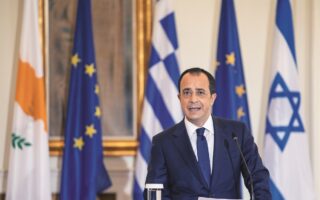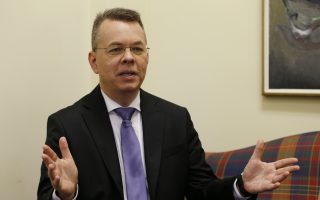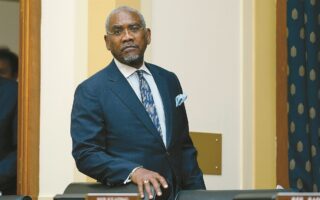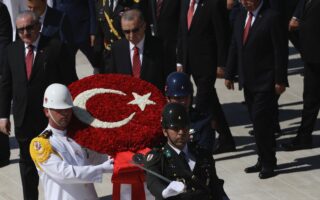Greece enjoys strong bipartisan support in Congress
In interview with Kathimerini, American Jewish Committee’s new CEO urges Ankara to ‘respect the rules’
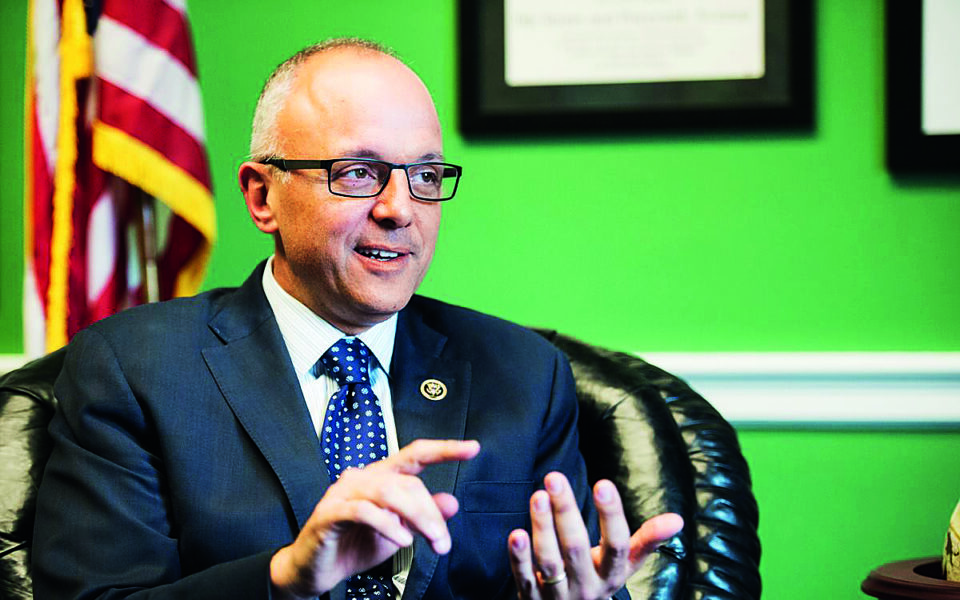
Two months after assuming the role of CEO of the American Jewish Committee (AJC), Ted Deutch, a former member of the US House representing Florida’s 22nd Congressional District, speaks to Kathimerini, affirming the strong ties between the Jewish and Greek diasporas, as well as Israel’s close relationship with Greece and Cyprus.
As chairman of the Middle East and North Africa subcommittee and as founding chair of the Congressional Hellenic Israel Alliance Caucus, Deutch played a leading role in promoting key diplomatic campaigns such as the 3+1 regional alliance scheme involving Greece, Cyprus, Israel and the United States.
In this interview, Deutch underscores Greece’s strategic significance which, he believes, “will only continue to increase in the future.” He grounds his conviction on the country’s renewed role in energy security amidst Russia’s war in Ukraine and on the importance of the northern port of Alexandroupoli and the Souda naval base on Crete to regional stability and American interests in the area.
For Deutch, Turkey is welcome to participate in regional institutions such as the East Mediterranean Gas Forum on the condition that it respects the rules which apply to the rest of the regional members, including those which derive from the UN Convention on the Law of the Sea. “Turkey’s refusal to recognize Hamas as a terrorist organization, its periodic saber-rattling and threats to Greek sovereignty, and its continued occupation of Cyprus are but a few of the issues Ankara must rectify,” he says.
The AJC head also hails the condemnation of Golden Dawn, the now-defunct neo-Nazi party, by Greece’s voters and legal system, while expressing his concern over the rise of antisemitism in the US and worldwide. Deutch sees need for more measures to fight the trend, as “we’ve seen how online antisemitism and hate leads to violence in real life.”
The American Jewish Committee has a long history of philhellenism. You have taken the helm of AJC after establishing yourself as one of the most philhellenic members of Congress. What do you look forward to in terms of next steps in the AJC/Greece and AJC/Greek-American community relationships?
As the founding chair of the Congressional Hellenic Israel Alliance Caucus, it is an honor to be able to continue working to advance ties between the global Jewish and Hellenic communities as CEO of the American Jewish Committee, an organization that has deep and long-standing ties to Greece, Cyprus and the Greek-American community. AJC’s special relationship with the Hellenic world has allowed it to play a part in many important historic developments – including the full upgrade of diplomatic relations in 1990, the deepening of the Greece-Cyprus-Israel trilateral relationship, and the establishment of the 3+1 mechanism that includes Greece, Cyprus, Israel and the United States. In a February 2013 piece in The Washington Times that Congressman [Gus] Bilirakis and I co-authored, we stated, “The new partnership between the Hellenic World and Israel is cause for optimism and offers benefits to the world disproportionate to the size of the nations involved.” Today, this is clearer than ever.
I am looking forward to supporting this essential trilateral relationship – and the partnership between the American Jewish and Greek-American groups that support it – as it continues to contribute to energy security, anti-terrorism efforts, and security and economic collaboration in the Eastern Mediterranean and beyond.
Greece’s role in increasing energy security amidst the war in Ukraine and the importance of Alexandroupoli and Souda Bay have made it more than obvious for policy makers that Greece’s strategic significance will only continue to increase in the future
AJC has also been at the forefront of major diplomatic initiatives like the 3+1 and the Abraham Accords. You got to see both take off as chairman of the Middle East and North Africa subcommittee. What is the significance of these regional developments and what more do you think the US must do to help realize their full potential?
The United States has played an indispensable role in establishing the 3+1 mechanism and the Abraham Accords and will play an equally pivotal role in continuing to advance and deepen these relationships.
The next year in particular will present fantastic opportunities to institutionalize the 3+1. The United States Senate is on the verge of naming the six senators who will make up the Interparliamentary Forum that was formed in the legislation that I co-authored last year – the US-Greece Defense and Interparliamentary Partnership Act. The meeting of parliamentary representatives from the US, Greece, Cyprus and Israel will be a pivotal moment in the 3+1 and will help to advance important initiatives that the US, Greece, Cyprus and Israel are collaborating on. That meeting should be followed up by a meeting between the US secretary of state and the foreign ministers of Greece, Cyprus and Israel.
The benefits of peace and coexistence with Israel are obvious, and we will continue to see countries in the Middle East deepen their relationships with Israel. Secretary [Antony] Blinken’s participation in the Negev Summit demonstrated that regional players continue to look to the US for both partnership and leadership.
While these developments are occurring, there is a notable player on the outside looking in – Turkey. Despite Recep Tayyip Erdogan’s recent attempts at rapprochement with Israel and the Gulf states, no substantive change of policy by Ankara has been revealed. What do you think it will take for Turkey to be a constructive part of a changing region?
You’re correct that Turkey has unfortunately chosen to remain on the outside looking in in the Eastern Mediterranean. All around the region, we are witnessing states that previously had hostile or frosty relations come together in a new spirit of cooperation. The door has never been closed for Turkey’s participation in institutions like the East Mediterranean Gas Forum, but Ankara has to agree to abide by the rules that the other members are agreeing to – including those emanating from the United Nations Convention on the Law of the Sea. Turkey’s refusal to recognize Hamas as a terrorist organization, its periodic saber-rattling and threats to Greek sovereignty, and its continued occupation of Cyprus are but a few of the issues Ankara must rectify if it truly wants to join the community of nations that is coming together in the Eastern Mediterranean.
As a new divided Congress gets set to begin in January, what do you think the foreign policy consequences – especially for Greece and the Eastern Mediterranean – will be?
Greece – and the regional initiatives I discussed – enjoys strong bipartisan support in Congress. I would like to remind everyone that the seminal Eastern Mediterranean Security and Energy Partnership Act – which I co-authored with Representatives Bilirakis and [David] Cicilline and Senators [Bob] Menendez and [Marco] Rubio – was passed into law by a divided Congress as well.
I’m confident that this bipartisan support will continue, and AJC will continue to work with our partners on both sides of the aisle to strengthen the US-Greece bilateral relationship and our cooperation in the Eastern Mediterranean. Prime Minister [Kyriakos] Mitsotakis certainly made a strong impression on my former colleagues during his Joint Address to Congress this past May, and there are many members of Congress that are highly engaged on these issues.
Both Ambassador [George] Tsunis in Greece and Ambassador [Alexandra] Papadopoulou in Washington are doing an exemplary job in engaging Congress. Greece’s role in increasing energy security amidst the war in Ukraine and the importance of Alexandroupoli and Souda Bay have made it more than obvious for policy makers that Greece’s strategic significance will only continue to increase in the future.
With the Eastern Mediterranean becoming even more important since Russia’s invasion of Ukraine, I anticipate an even higher level of Congressional engagement – especially when it comes to the full implementation of the Eastern Mediterranean Security and Energy Partnership Act of 2019 and the US-Greece Defense and Interparliamentary Partnership Act.
Fighting antisemitism and the rejection of Golden Dawn
One of AJC’s top priorities is the battle against antisemitism. High-profile instances of antisemitism – like the case of Kanye West – immediately landed in your inbox as soon as you took over AJC. How do we prevent antisemitism from being normalized?
You’re right – almost immediately after starting as the CEO of AJC, Kanye West started spewing vile antisemitic rhetoric to a massive audience online, and Kyrie Irving promoted a film full of dangerous antisemitic conspiracy theories. Unfortunately, these aren’t one-off instances – antisemitism continues to rise in the United States and around the world at alarming rates. Moreover, time and time again, we’ve seen how online antisemitism and hate leads to violence in real life. It’s so important that we work together to fight antisemitism, and I’m grateful to the Greek government and the Greek community for being such a strong partner in this fight.
‘It’s so important that we work together to fight antisemitism, and I’m grateful to the Greek government and the Greek community for being such a strong partner in this fight’
In Greece Golden Dawn has been rejected.
It is more important than ever that action is taken to prevent the “normalization” of antisemitism. Greece’s adoption of the International Holocaust Remembrance Alliance’s (IHRA) Working Definition of Antisemitism, the rejection of Golden Dawn by the Greek voters and the Greek legal system, and the warm relations with Israel across Greece’s political spectrum are all examples of actions that I hope we see more of across the world. Moreover, we all must call out antisemitism wherever it occurs. That includes the belief that Israel should not exist or that the Jews, alone among the people of the world, do not have a right to self-determination. I am looking forward to speaking at the Mayor’s Conference on Antisemitism being hosted by Mayor Kostas Bakoyannis this week, and I am confident that Greece’s allyship will inspire strong local policies aimed at countering antisemitism all around the world.
Kathimerini’s event on Hellas and the diaspora
On Thursday, Kathimerini, in partnership with the Hellenic American Leadership Council (HALC) and the Delphi Economic Forum, is organizing an event on the future of the decisive relationship between Greece and its diaspora, during which Ted Deutch will hold a discussion with HALC Executive Director Endy Zemenides, moderated by the editor in chief of Kathimerini English edition, Tom Ellis.
The Jewish diaspora can serve as an example for Hellenism, while close cooperation between the Greek and Jewish communities in countries with global influence has now assumed a strategic dimension.
As co-chair of the Congressional Hellenic Israel Alliance, Deutch was a fervent advocate behind the 3+1 regional cooperation scheme that brought together Greece, Cyprus, Israel and the US. He is co-author of the Eastern Mediterranean Security and Energy Partnership Act of 2019, and of the US-Greece Defense and Interparliamentary Partnership Act of 2021. Last year he was the lead sponsor of the Libya Stabilization Act.
In 2020, Deutch, as a member of Congress, received the Athens-Wishner Award from HALC and AJC.
